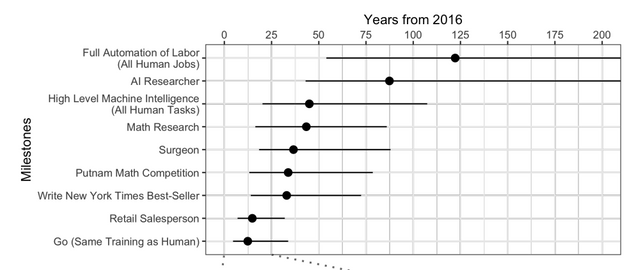Maybe. Probably.

You see the image above from MIT Technology Review article?
Those error bars are huge, and for a good reason. It’s very difficult to estimate when AI will be able to outperform humans in different disciplines, and estimates vary wildly.
The large uncertainty shows how experts widely disagree on how long it will take to reach milestones, and there’s a trend, especially in mainstream media, to underestimate the time it takes, and makes it sound like doomsday is just around the corner due to the recent increase in computing power.
Furthermore, it’s difficult to predict when field changing breakthroughs are going to happen. Which are likely required to achieve, for example, high level machine general intelligence as current methods, predominantly machine learning, only works on singular tasks.
However, there’s also reason to believe it may come sooner. Take Go for example, it was predicted it would take between 6 and 30 years. Not only is that an uncertainty of 500%, but Google beat the world champion already in March 2016.
This was largely due to the unforeseen power of deep reinforcement learning for games.
As there seems to be a clear path to achieving self driving cars/trucks; no need for new breakthroughs, and the fact that we already have working prototypes would suggest that self driving vehicle technology would come soon. Maybe even before 2027.
However, another thing to take into consideration is how fast the legislation can adapt to AI; this is especially important if the technology comes sooner rather than later.
It’s entirely possible that we have safe fully autonomous self driving cars years before they are allowed to drive on the road.
The same goes for AI safety. We are already now seeing machine learning models predicting things the programmers didn’t intend - it’s possible that the “models” will become sufficiently advanced, or important to cause damage before we have developed the mathematics to keep them safe. But that’s for another post.
As for autonous vehicals, I believe the biggest barriers will be political.
The technology will be ready ready for the mass market very soon, in the next couple years. For example, look at Telsa who will be driving completely autonomously from the heart of Los Angeles to the heart of New York by the end of this year. Google has driven 2 million miles over 8 years and has only had one minor incident.
What will slow down the adoption of this technology (for good or for bad) is the regulations.
Downvoting a post can decrease pending rewards and make it less visible. Common reasons:
Submit
The biggest problem right now with self-driving vehicles is not driving long distances on well known nice roads, but driving on small, poorly maintained, and not often traveled roads.
While these achievements are important, they don't really prove anything about the real challenge.
Downvoting a post can decrease pending rewards and make it less visible. Common reasons:
Submit
Before 2027! The AI could even be rather dumb (compared to humans) and still be able to drive better than we humans can. Why? We do not have eyes in the back of our heads for example. The number of sensors creating the 'awareness' for driving the Tesla cars has recently been upgraded by several factors even though it was already driving safer than humans.
This is all on a trajectory indicating a safer world rather than the 'robots-are-taking-over' world and that's a good direction!
Downvoting a post can decrease pending rewards and make it less visible. Common reasons:
Submit